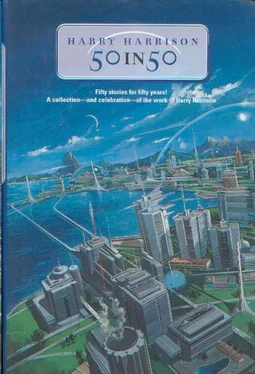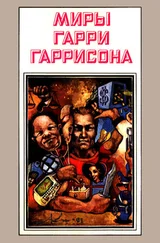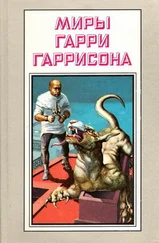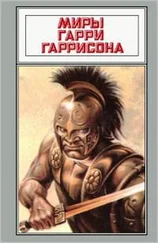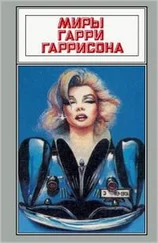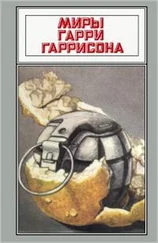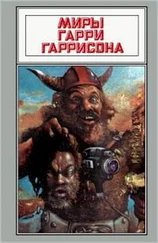Гарри Гаррисон - 50 in 50
Здесь есть возможность читать онлайн «Гарри Гаррисон - 50 in 50» весь текст электронной книги совершенно бесплатно (целиком полную версию без сокращений). В некоторых случаях можно слушать аудио, скачать через торрент в формате fb2 и присутствует краткое содержание. Жанр: Фантастика и фэнтези, на английском языке. Описание произведения, (предисловие) а так же отзывы посетителей доступны на портале библиотеки ЛибКат.
- Название:50 in 50
- Автор:
- Жанр:
- Год:неизвестен
- ISBN:нет данных
- Рейтинг книги:5 / 5. Голосов: 1
-
Избранное:Добавить в избранное
- Отзывы:
-
Ваша оценка:
- 100
- 1
- 2
- 3
- 4
- 5
50 in 50: краткое содержание, описание и аннотация
Предлагаем к чтению аннотацию, описание, краткое содержание или предисловие (зависит от того, что написал сам автор книги «50 in 50»). Если вы не нашли необходимую информацию о книге — напишите в комментариях, мы постараемся отыскать её.
50 in 50 — читать онлайн бесплатно полную книгу (весь текст) целиком
Ниже представлен текст книги, разбитый по страницам. Система сохранения места последней прочитанной страницы, позволяет с удобством читать онлайн бесплатно книгу «50 in 50», без необходимости каждый раз заново искать на чём Вы остановились. Поставьте закладку, и сможете в любой момент перейти на страницу, на которой закончили чтение.
Интервал:
Закладка:
Martin bent over and looked in through the hooded opening.
"Just perfect isn't it? But if for any reason the operator is dissatisfied the image can be changed now in any manner desired by manipulation of the editorial controls. And when satisfied the print button is depressed, the image is printed on a film of reusable plastic sheet, charged electrostatically in order to pick up the powdered ink and then the picture is printed in a single stroke onto the paper below."
A pneumatic groan echoed theatrically from the bowels of the machine as a rectangular box crept down on a shining plunger and pressed against the paper. It hissed and a trickle of vapor oozed out. The machine rose back to position and the man in the coveralls held up the paper, smiling.
"Now isn't that a fine piece of art?"
Martin grunted.
Pachs looked at it and couldn't take his eyes away: he was afraid he was going to be sick. The cover was not only good, it was good Caniff, just as the master might have drawn it himself. Yet the most horrible part was that it was Pachs' own cover, his own layout. Improved. He had never been what might be called a tremendous artist, but he wasn't a bad artist. He did all right in comics, and during the good years he was on top of the pack. But the field kept shrinking and when the machines came in it went bust. There was almost no spot for an artist now. Just a job here and there as sort of layout boy and machine minder. He had taken that — how many years now? — because old and dated as his work was he was still better than any machine that drew heads with a rubber stamp.
Not anymore. He could not even pretend to himself anymore that he was needed, or even useful.
The machine was better.
He realized then that he had been clenching his fists so tightly that his nails had sunk into the flesh of his palms. He opened and rubbed them together and noticed that they were shaking badly. The Mark IX was turned off and they were all gone: he could hear Miss Fink's machine takking away in the outer office. The little girl was telling Martin about the special supplies she would need to buy to operate the machine, and when Pachs closed the connecting door he cut off the grumbling reply about extra expenses not being mentioned.
Pachs warmed his fingers in his armpits until the worst of the tremors stopped. Then he carefully pinned a sheet of paper onto his drawing board and adjusted the light so it would not be in his eyes. With measured strokes he ruled out a standard comic page and separated it into six panels, making the sixth panel a big one, stretching the width of the page. He worked steadily at the penciling, stopping only once to stretch his back and walk over to the window and look out. Then he went back to the board and as the afternoon light faded he finished the inking. Very carefully he washed off his battered but still favorite Windsor & Newton brush and slipped it back into the spring holder.
There was a bustle in the outer office and it sounded like Miss Fink getting ready to leave, or maybe it was the new girl coming back with the supplies. In any case it was late, and he had to go now.
Quickly, before he could change his mind, he ran full tilt at the window, his weight bursting through the glass, and hurtled the twenty-three stories to the street below. Miss Fink heard the breaking glass and screamed, then screamed louder when she came into the room. Martin, complaining about the noise, followed her, but shut up when he saw what had happened. A bit of glass crunched under his shoes when he looked out the window. The doll-like figure of Pachs was visible in the center of the gathering crowd, sprawled from sidewalk to street and bent at an awful angle as it followed the step of the curb.
"Oh God, Mr. Martin, oh God look at this…" Miss Fink wailed.
Martin went and stood next to her in front of the drawing board and looked at the page still pinned there. It was neatly done, well drawn and carefully inked.
In the first panel was a self-portrait of Pachs working on a page, bent over this same drawing board. In the second panel he was sitting back and washing out his brush. In the third standing. In the fourth panel the artist stood before the window, nicely rendered in chiaroscuro with backlighting. Five was a forced perspective shot from above, down the vertical face of the building with the figure hurtling through the air towards the pavement below.
In the last panel, in clear and horrible detail, the old man was bent broken and bloody over the wrecked fender of the car that was parked there: the spectators looked on, horrified.
"Look at that will you," Martin said disgustedly, tapping the drawing with his thumb. "When he went out the window he missed the car by a good two yards. Didn't I always tell you he was no good at getting the details right?"
Mute Milton
With ponderous smoothness the big Greyhound bus braked to a stop at the platform, and the door swung open. "Springville," the driver called out. "Last stop!" The passengers stirred in the aisle and climbed down the steps into the glare of the sun. Sam Morrison sat patiently, alone, on the wide rear seat, waiting until the last passengers were at the door before he put the cigar box under his arm, rose and followed them. The glare of sunlight blinded him after the tinted glass dimness of the bus, and the moist air held the breathless heat of Mississippi summer. Sam went carefully down the steps, one at a time, watching his feet, and wasn't aware of the man waiting there until something hard pushed at his stomach.
"What business yuh got in Springville, boy?"
Sam blinked through his steel-rimmed glasses at the big man in the gray uniform who stood before him, prodding him with a short, thick nightstick. He was fat as well as big, and the smooth melon of his stomach bulged out over his belt worn low about his hips.
"Just passing through, sir," Sam Morrison said and took his hat off with his free hand disclosing his cut-short grizzled hair. He let his glance slide across the flushed, reddened face and the gold badge on the shirt before him, then lowered his eyes.
"An' just where yuh going to, boy? Don' keep no secrets from me…" the voice rasped again.
"Carteret, sir, my bus leaves in an hour." The only answer was an uncommunicative grunt. The lead-weighted stick tapped on the cigar box under Sam's arm. "What yuh got in there — a gun?"
"No, sir, I wouldn't carry a gun." Sam opened the cigar box and held it out: it contained a lump of metal, a number of small electronic components and a two-inch speaker, all neatly wired and soldered together. "It's a… radio, sir."
"Turn it on."
Sam threw a switch and made one or two careful adjustments. The little speaker rattled, and there was the squeak of tinny music barely audible above the rumble of bus motors. The red-faced man laughed.
"Now that's what ah call a real nigger radio. . piece uh trash." His voice hardened again. "See that you're on that bus, hear?"
"Yes, sir," Sam said to the receding, sweat-stained back of the shirt, then carefully closed the box. He started towards the colored waiting room, but when he passed the window and looked in he saw that it was empty. And there were no dark faces visible anywhere on the street. Without changing pace Sam passed the waiting room and threaded his way between the buses in the cinder parking lot and out of the rear gate. He had lived all of his sixty-seven years in the State of Mississippi; so he knew at once that there was trouble in the air— and the only thing to do about trouble was to stay away from it. The streets became narrower and dirtier, and he trod their familiar sidewalks until he saw a field worker in patched overalls turn into a doorway ahead under the weathered BAR sign. Sam went in after him; he would wait here until a few minutes before the bus was due.
Читать дальшеИнтервал:
Закладка:
Похожие книги на «50 in 50»
Представляем Вашему вниманию похожие книги на «50 in 50» списком для выбора. Мы отобрали схожую по названию и смыслу литературу в надежде предоставить читателям больше вариантов отыскать новые, интересные, ещё непрочитанные произведения.
Обсуждение, отзывы о книге «50 in 50» и просто собственные мнения читателей. Оставьте ваши комментарии, напишите, что Вы думаете о произведении, его смысле или главных героях. Укажите что конкретно понравилось, а что нет, и почему Вы так считаете.
